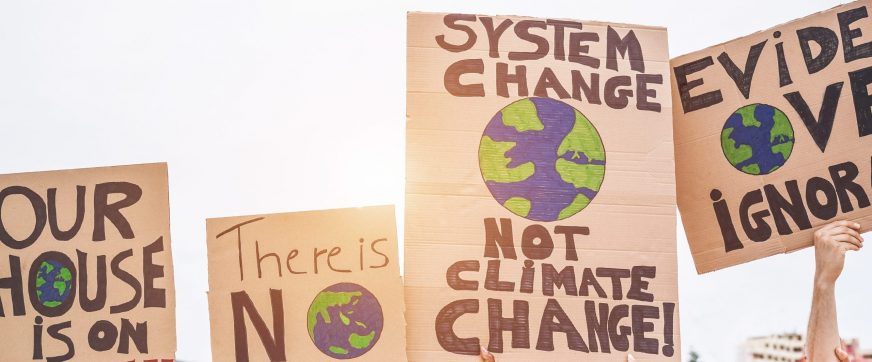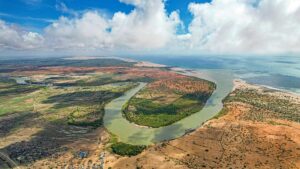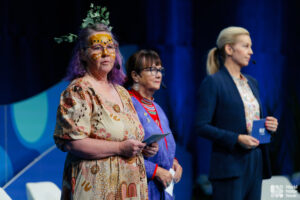- SIWI – Leading expert in water governance
- /
- Latest
- /
- “The world needs a new kind of climate policy to reach the goals of the Paris Agreement!”
“The world needs a new kind of climate policy to reach the goals of the Paris Agreement!”

Five years ago, international leaders could triumphantly announce the Paris Agreement to tackle the climate crisis. But to reach the goals, the world needs a new kind of climate policy, argues SIWI’s Maggie White ahead of the UN Climate Ambition Summit on 12 December.

As head of SIWI’s International Policy team, how would you describe today’s climate debate?
On the positive side, there are many things happening now, despite the pandemic. On the dates the COP26 meeting was meant to be held, we instead had the Race to Zero November Dialogues, where SIWI and partners led the very successful Water Day. Thereafter followed the UN Climate Change Dialogues and now the UN Climate Ambition Summit on 12 December.
This is important for two reasons. First, climate action cannot be allowed to slow down because of the pandemic, so it is very encouraging that more than 120 countries have now pledged to be carbon neutral by 2050. Second, we must not only take swift action – we must take the right actions. This is where I feel it is so important to talk about water in the climate context. Climate change is primarily felt in the form of too much or too little water; floods, droughts, landslides, and storms are becoming more frequent and more severe. So, climate policy must focus on making both human societies and ecosystems more resilient despite rising global temperatures.
We have now developed the Climate Action Pathway for Water to raise awareness of how water can and must be used to address climate change. Water must be an integral part of all climate conversations because most decisions have enormous impact on water resources. At the same time, water and sanitation can offer formidable solutions to reach adaptation and mitigation targets. Many people in the energy sector are not aware of how water-intensive many new and clean energy sources are. It is also important to raise awareness of how wastewater treatment can both generate energy and reduce emissions of greenhouse gases such as methane.
Especially at a time of very fast and massive transformations, we must ensure that we do not make decisions that create new problems, for example aggravating the water crisis, and instead opt for solutions that help us address several problems at once. This is why we need a new climate debate with a more integrated approach.
What has changed compared to when the Paris Agreement was launched?
The climate debate has, until recently, been very focused on mitigation targets that seek to reduce carbon emissions sector by sector. But we have failed to take into account how interconnected the world is and the exponential nature of climate change. What we do in one place or in a specific area will have consequences elsewhere that we are not sure of. Hence climate policy should not only be about reducing carbon emissions but also about boosting nature’s ability to store carbon.
We are now starting to change the way we look at the climate crisis. The nine planetary boundaries that were presented by Professor Johan Rockström and others a decade ago helped us understand more about these linkages and how they often are about water, for example how snowcaps melting in the Arctic can have a strong impact on the Amazon forest.
With water resources becoming increasingly scarce – by 2050, it is estimated that more than half the global population could live in water-stressed regions – this will increase the pressure on water systems. Research from the Stockholm Resilience Centre shows how a water boundary is needed to keep water consumption for people and our economies aligned with environmental requirements. Only then can we maintain the overall resilience of the Earth system and avoid the risk of ‘cascading’ effects, transgressing local and regional thresholds.
What should a new climate debate focus on?
The new climate debate should focus more on strengthening the resilience of both ecosystems and human societies whilst reducing economic risks. To do so, we must ask ourselves what kind of societies we want to live in and be aware of trade-offs between different interests. If we only look at one problem at a time, we may solve this particular problem at the expense of something else so that we are not really better off in the long term. In the coming decade we will have to reverse the dangerous trends when it comes to climate change and degradation of nature, while also reaching the Sustainable Development Goals (SDGs) of the 2030 Agenda. This will require an integrated approach and water is the natural connector.
What I have found inspiring in the past year is that more voices are heard in the climate debate, not the least from women and young people who are strong agents of change; helping to transform our societies. It is also very important that the invaluable knowledge of indigenous peoples is increasingly acknowledged.
How is SIWI supporting this change?
SIWI will continue to play a leading role in advocating for this new, integrated, and inclusive approach to climate action. Ahead of COP26 in November, we will work tirelessly to help countries strengthen their Nationally Determined Contributions (NDCs) to the Paris Agreement and develop more efficient climate policies that also reduce the gaps between the rich and the poor. There are a number of great water-related solutions that should be used much more because they multi-task and solve more than one problem at once. Cities can for example use more nature-based solutions in their planning and design to become resilient to floods and storms while getting access to more clean water and ensuring access to sanitation and basic hygiene.
Furthermore, we will raise awareness of the many water aspects of energy production, agriculture, and industry so that we make smart decisions that are sustainable in the long term. Here it is critical for more people to understand and value water, which has so far often been taken for granted, despite worrying reports about growing water scarcity and water pollution.
What do you expect of the coming year?
It will be a very decisive year in many ways, with hard work. In January, SIWI will play a leading role at the Climate Adaptation Summit, which we hope will place the importance of climate adaptation at the top of the global agenda. During the summit’s water anchoring event SIWI will contribute to elevating the importance of water in the Covid-19 response, as well as in the implementation of the NDCs to the Paris Agreement and the SDGs of the 2030 Agenda. This is also something we will continue to highlight throughout the year, in the lead-up to COP26 in November, with a focus on resilience to build back better and faster.
World Water Week in August, on the theme Building Resilience Faster, will be instrumental in developing concrete solutions and bringing different actors together. We must advocate for more investments that help especially low-income countries redesign their societies so that they are not constantly pushed further into poverty by growing food insecurity and recurring natural disasters.
With different leading figures and institutions, such as UNDP’s Ulrika Modeer and Haoliang Xu, recognizing that climate smart water management is fundamental for the sustainable development goals, I am confident that we are entering a new era. Looking ahead at 2021, I believe that the importance of resilience will grow in our hearts and minds, with the water-climate nexus offering a basket full of inspiring and transformative solutions.
Most recent

Why sharing data matters for water cooperation in the Juba–Shebelle Basin
- Transboundary Water Cooperation
- Water and climate

TIARA in Zambia: Scaling resilient rainfed agriculture in the Zambezi Basin
- Agriculture and water
- Freshwater and ecosystems/biodiversity
- Resilience through water
- Water in landscapes
- Water and climate

Why climate action must integrate water
- Water and climate
- World Water Week
- Water governance

SIWI joins Wallenberg-funded forest resilience research



